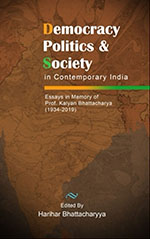Contemporary buzz on Indian democracy (Roy Chowdhury and Keane, 2021; Yadav, 2020; Nielsen and Nielsen, 2019; Rudolph and Rudolph, 2014) analyses its evolving features. The book under review, written in memory of Professor Kalyan Bhattacharya (a faculty of Political Science in Vivekananda Mahavidyalay under the University of Burdwan, 1966-1994), probes into the making of the democracy discourse in India. Inspired by Professor Bhattacharya’s de-taste to a mechanical interpretation of Marxism, support to gender equality, writings on uncharted territory of Indian sociology (highlighting the evolution of Bankim Chandra’s perspective from Samya (equality) to Dharmattatva (common knowledge) and inter-religious amity in the idea of jatiyabhav (nationhood) of Bhudev Mukhopadhyay), this edited volume insightfully re-designs interactions between state, politics and society as interactions between ‘state problematic (sovereignty), democratic problematic (liberty, equality, identity) and societal problematic (hierarchy and diversity)’ (p. 28).
Exploring the under-researched ‘methodological question of state capacity in a democracy’ (p. 17), the introduction by the editor titled ‘Democracy: More Questions, Few Answers’ argues that in India, ‘democracy-making’ and ‘state-making’ moved in parallel directions resulting in multiple interactions of democracy with ‘anti-democracy’ elements as the ‘entire space of nation state is political society which is to be civil in nature and actions’ (p. 42)—a journey which India still traverses.


Wow, amazing blog layout! How long have you ever been blogging for?
you made blogging glance easy. The total glance of your site is great,
as smartly as the content! You can see similar here najlepszy sklep
It’s truly a nice and useful piece of information. I am happy
that you shared this helpful info with us. Please stay us up to
date like this. Thanks for sharing. I saw similar here: E-commerce
Hi there! Do you know if they make any plugins to assist with SEO?
I’m trying to get my blog to rank for some targeted keywords but I’m not
seeing very good results. If you know of any please share.
Thank you! You can read similar article here: Sklep online
Good day! Do you know if they make any plugins to assist with Search Engine Optimization? I’m
trying to get my blog to rank for some targeted keywords but I’m not seeing very good success.
If you know of any please share. Thanks! You can read similar art here:
Sklep online
It’s very interesting! If you need help, look here: ARA Agency